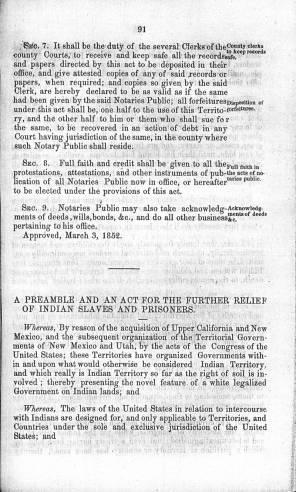2.2 Utah Territorial Legislature Bill, A Preamble and an Act for the Further Relief of Indian Slaves and Prisoners
A Preamble and an Act for the Further Relief of Indian Slaves and Prisoners
Document Introduction
The bill that lawmakers passed attempted to navigate the difficult terrain between the lingering question over what constituted “Indian country” and the Mormon desire to respond out of the “common principles of humanity” to the Indian captives presented to them for sale. The preamble makes an appeal to emotions, paternalism, the prevailing national view of Native Americans as primitive and degraded, and humanitarian impulses. It revolves around the very difficult moral dilemma Mormons faced when Indian captives were presented to them for purchase. They defined their legal solution to that dilemma in four short sections. The law was designed to regulate the purchase and care of the Indian captives and bring the practice under territorial control. It was also designed to save the lives of Native Americans and was written out of a hope that Mormon settlers might offer an education, an avocation, clothing, and perhaps a better life for the captives than they might have had if they remained in the hands of Ute traders.[1] Of course reality rarely matched such ideals. The lack of sources from the perspective of the women and children who were purchased in these cases makes any assessment of their stories difficult, although historians have tried. As the debate over the bill makes clear, lawmakers themselves were not convinced that they were doing the right thing when they passed the bill. It nonetheless became law on March 6, 1852.
[1] Preamble and an Act for the Relief of Indian Slaves and Prisoners, in Acts, Resolutions, and Memorials, Passed by the First Annual, and Special Sessions, of the Legislative Assembly of the Territory of Utah, Begun and held at Great Salt Lake City, on the 22nd day of September, A. D., 1851(Great Salt Lake City, Utah Territory: Brigham H. Young, Printer, 1852), 91-93.


